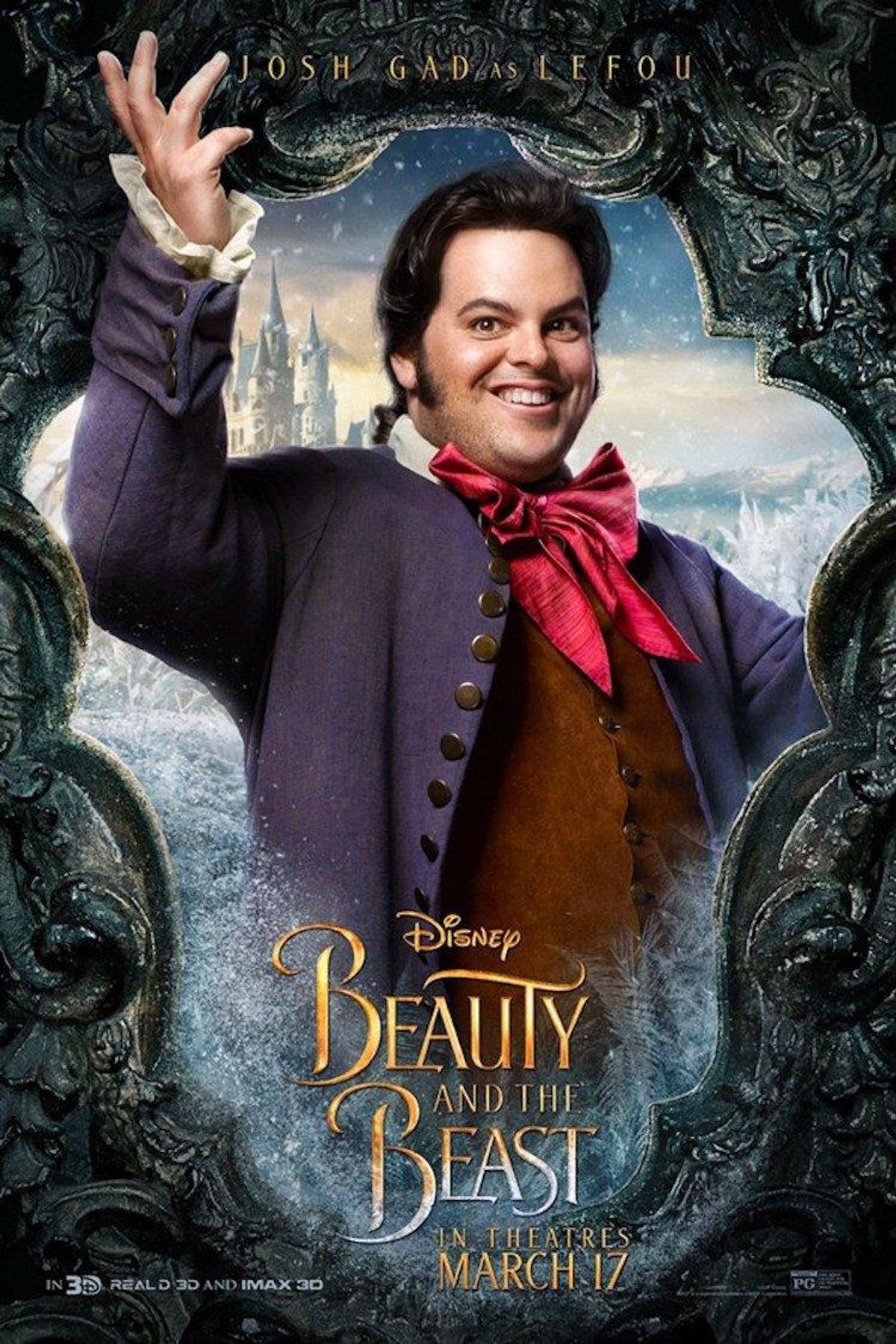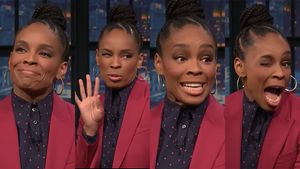Movie companies are always about 40 years late to the table with allegedly groundbreaking material, and then they always make sure to congratulate themselves on the incredible courage involved in what they've done. So I was wary upon hearing all the hoopla about how Le Fou, the clowny sidekick (played by Josh Gad) of the preening Gaston (Luke Evans) in the new Beauty and the Beast film is openly gay. And I wasn't alone. In advance of the film being seen, people were already kvetching on social media that the character happens to be a fool and invokes the tired trope of being in love with a hunky straight guy, namely Gaston. And indeed it was only last November that I declared an end to the stereotype that gay guys always lust for hetero studs; "That's an old one from the self loathing days," I wrote right here.
Related | Beauty & the Beast to Feature Disney's First 'Exclusively Gay Moment'
But then I saw the film, directed by an old Columbia College chum of mine, Bill Condon, the openly gay director of Chicago and Dreamgirls. At first it was irritating to see Le Fou simply imply that he's hot for Gaston. I know this story takes place in a time way before Stonewall, ACT UP, and Grindr, but I hoped there'd be more to the story than him simply trying to keep Gaston away from various women, ending up in his arms in the middle of a shtick, singing an appreciative song about him (which the same character did in the animated movie and the Broadway show), and declaring that he's only not married (to a woman) because he's been called too clingy. Those are all lovely hints that Le Fou bats for the other team, but nothing more than that. But then something happens at the very end of the film that I won't give away. It's something you'd better not blink through or you'll miss it, but it's pretty special and it eliminates the previous vagueness and also takes Le Fou away from his love of Gaston, on to something greater. And by the way, I don't mind that the character is supposed to be a sort of jester; I didn't find him a buffoon, just a fun wacko. So, congratulations, Disney. Now how about an updated movie about Chip 'n' Dale?
Related | Beauty and the Beast Gay Character Sparks Outrage from Small-Town Alabama to Russia
As for the alleged backlash against the gay character, does anyone really care if an Alabama drive-in is planning to ban showing the movie, and the Russian government is considering doing the same? If a solitary dumbass theater wants to use hate and exclusion to diminish their own business, then great! People will simply go to the other 4000 or so theaters showing the film to see it. Since the drive-in doesn't approve of gayness, sex, or cursing, I can't even imagine what they WILL show--probably feature-length commercials for Lalaloopsy? And the Russian government? The folks who regularly destroy gays and dissenters and women and human rights (and which Trump seems to be a fan of)? Does anyone really want their endorsement? The movie will rake in kazillions, as these bigots and losers fume by the sidelines, watching the world change, from a ridiculous distance.
THE REAL AMERICAN HORROR STORY

Related | Jessica Lange is Joan Crawford in Ryan Murphy's Feud
Two same-sex people in love is certainly a nicer occurrence than serious hating going on. But Ryan Murphy's Feud series is appealing to gays of a certain age because of the inherent camp value in digging up the mutual distaste of Oscar winners Bette Davis (played by Susan Sarandon) and Joan Crawford (Jessica Lange). And there are so many other delicious rivalries Murphy can excavate, some of them inherent in this season already. Two of the real-life people portrayed in the show--actress Olivia de Havilland (played by Catherine Zeta Jones) and gossip columnist Hedda Hopper (Judy Davis)--had long running feuds of their own, Olivia with her sister Joan Fontaine and Hedda with rival columnist Louella Parsons. Let me hereby propose them for future seasons. And then there's Donald Trump vs... everybody.
Related | Ryan Murphy Interviews Jessica Lange on Fame, Feuds & the Feminine Mystique
Last night's first episode? As I sat down with my case of Pepsi, the hour-plus has-been showdown proved to be such high camp it almost turned me straight again. It was delicious to watch Jessica Lange's Joan snarling about Marilyn Monroe, "I've got great tits too, but I don't throw 'em in everyone's face!" and summon her best Faye Dunaway to yell at director Robert Aldrich that she wants more expense money than Bette Davis. Epithets like "queen bitch" and "cunt" got tossed around, and as Joan's maid, Jackie Hoffman got to bark suggestive lines like "It was an honor to prune Miss Crawford's bush." Yes, this thing is done by gay men--including co-writer/coproducer Jaffe Cohen, who used to be one of the standup group Funny Gay Males--and advertisers knew just who'd be turning in; there were commercials for War Paint, the Broadway musical about feuding cosmetics divas. While Lange did tremendously, I was a little disappointed with Sarandon's Bette, though at least she wasn't trying to do an impersonation. Next season will be about Prince Charles and Princess Di, but last night, Catherine Zeta Jones' Olivia putt dramatic weight on her contention that feuds are rooted in pain. Sounds like Ryan Murphy is already onto my idea for a future season!
THE PAGE MASTER
Someone who feuded with more than one person in her pursuit of art, Geraldine Page was one of the bravest, most original, and brilliant actresses of her time. She is colorfully remembered in Turning Page, in which daughter Angelica Page says how wrong it is that Geraldine hasn't been aptly memorialized via a book, an American Masters special, or a star on the Walk of Fame, so she's going to personally make up for that via research, performance, and channeling. In the impressive show, Angelica is overcome with the presence of her mom as she dons a headwrap, scarf, and dark glasses and captures her wonderfully crooked mouth, which could switch from coquettishly girlish to frighteningly growling in the bat of an eye. Angelica's Geraldine tells us about her obsession with theater (mainly conducted because, as a repressed Methodist, she wanted to immerse herself in characters other than herself) which led her into the realization that Hollywood is built on phoniness. (When she did Tennessee Williams' Summer and Smoke and Sweet Bird of Youth on Broadway, Geraldine wore tatters, but for the big screen, suddenly she was bedecked in glorious gowns tragically ill-suited to the characters.) She had steamy romances with studly rebels Marlon Brando and James Dean ("Jimmy was not gay--at least not when I was around"). But not as felicitous was a contretemps with Hondo costar John Wayne, who tried to tell her how to say every line. Geraldine responded by telling the press what a reactionary creep he was. Wayne was horrified when she bagged the only Oscar nomination for the film.
And not surprisingly, Geraldine was a big slapper. She slapped Amanda Plummer onstage during Agnes of God, and supposedly Plummer was brilliant after that. "Slap me tomorrow night!" costar Elizabeth Ashley urged Geraldine. And Geraldine also slapped Rebecca De Mornay when they were doing a Sam Shepard play together; De Mornay had gotten too into her fellow actress's space and was fired, though today, I bet, she'd be able to take Geraldine up on charges.
De Mornay had appeared in the film of The Trip To Bountiful, which won Page her Oscar after eight nominations. (When presenter F. Murray Abraham announced that the winner was someone who "I consider to be the greatest actress in the English language," I'm surprised all five nominees didn't run up to the stage.) In this show, we learn that Anne Bancroft was nominated for playing Geraldine's stage role in Agnes of God, which was denied Geraldine because director Norman Jewison felt she wasn't a film actress. ("I guess he didn't know about all my Oscar nominations.") But that's OK; she got to do Bountiful, which was a perfect valedictory venue in which to show off her glorious gifts.
Not so bountiful was the time a gossip item alerted Geraldine that her husband--and Angelica's father--actor Rip Torn had impregnated a younger actress. This leads to a bitter take on "shadenfreude"--whereby people enjoy the misfortune of others--and results in Geraldine sardonically feeling that her heart condition was caused by her hubby breaking her heart with his shady antics.
Angelica Page does brilliantly, as directed by Wilson Milam. The result is a real Page turner.
HIS HEART WILL GO ON
Another terrific vehicle is Significant Other, the Joshua Harmon play (directed by Trip Cullman) about a 20-something gay guy who remains poignantly dateless as his three female besties get hitched. You've heard the expression "Always a bridesmaid." Well, Jordan Berman can't even be a bridesmaid! He's always left out, ignored, dissed, and dumped. On a sort of date with a hot guy, he keeps saying the wrong things, and he even ends up sending off a gushy email that backfires, since--like Evan Hansen--he hasn't learned proper communication skills. The play is nothing new--the eternal bachelor who has problems with the dating game is a familiar theme--but it's done with wit and pathos, and having a lead character who just happens to be gay gives the whole thing a fresh twist. Gideon Glick is tremendous as the quirky outcast who puts apple stickers on his neck for connection and who fancies himself still fat even though he only used to be. Glick makes Jordan adorably appealing, while also letting us see how his self-pity can turn to rage and jealousy. There are wonderful musical snippets involving Celine Dion and Joni Mitchell--and best of all, Lee Ann Womack, whose "I Hope You Dance" is hilariously mimed to by Jordan and two girlfriends (Lindsay Mendez and Rebecca Naomi Jones) as the third gal (Sas Goldberg) does her spotlight wedding dance with her new hubby. (Sam Pinkleton did the choreography.) There's also Barbara Barrie as wise, old granny, urging Jordan to never get old, but not to die young either. Significant Other is light and snappy, but pretty irresistible. Bring a date.
ATTEND THE TALE OF SWEENEY TODD

And finally, here's something you should probably see alone: the Tooting Arts Club production of Sweeney Todd: The Demon Barber of Fleet Street, directed by Bill Buckhurst, at the Barrow Street Theatre. "As if we haven't had enough scaled down Sondheim," I moaned on entering the theater. But this was different. The space had been transformed into a replica of Harrington's Pie and Mash Shop, London's oldest continuously operating pie shop, where this production happened to have started out. It was bright and lived-in, with long tables and lots of ominous atmosphere. Just like people did in London, we arrived early and were greeted with a meat pie with mash, along with a beverage. (Waitress should be doing the same--with cherry pie, of course). The orchestra turned out to be just three players (a pianist, a violinist, and a woodwind guy), but the second the show started, all doubts went flying like a barber's used razor. With the actors right up in your grill--and prancing on top of tables--the feeling is immediate and accessible, capturing the dark humor of the piece (score by Stephen Sondheim, book by Hugh Wheeler from an adaptation by Christopher Bond), with all the wit, pathos, and weirdness intact.
Jeremy Secomb is powerfully brooding as the demon barber with a taste for blood, Siobhan McCarthy is wonderfully adorable and grotesque as the pie lady who figures out how to make Shepherd's pie with real shepherd, and everyone else is in top form too, abetted by deft lighting effects and clever staging. With three of Sondheim's most hauntingly beautiful songs ("Johanna," "Pretty Women," "Not While I'm Around") bejeweling all the musky antics, this may be Sondheim's most fabulous work, and by stripping things to the bone, this production makes it soar again. And it's even scarier than What Ever Happened To Baby Jane?



























































































